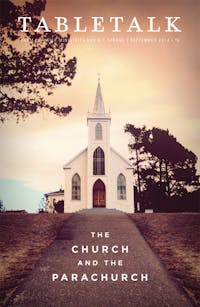
Request your free, three-month trial to Tabletalk magazine. You’ll receive the print issue monthly and gain immediate digital access to decades of archives. This trial is risk-free. No credit card required.
Try Tabletalk NowAlready receive Tabletalk magazine every month?
Verify your email address to gain unlimited access.
The Sadducees and Pharisees were no dummies. They just weren’t as smart as their enemy. As we read through the gospel accounts, it seems their strategy was simple: they would put an end to Jesus by forcing Him to destroy Himself. They would silence Him by forcing Him to put His own foot in His own mouth. They posed trick questions: Should we pay taxes to Caesar? At the resurrection, who will be the husband of a woman who went through six levirate husbands after her first husband? In the first instance, they wanted Jesus to run afoul of the Romans; in the second, to run afoul of His own people. In both instances, Jesus escaped the trap. He who is the Word, who spoke the world into existence, is never at a loss.
It may well be that the most challenging question Jesus received, however, came neither from the Sadducees nor the Pharisees but from Pontius Pilate. Having been delivered over to be put to death, Jesus is asked, “Are you the king of the Jews?” That’s a dilemma. Answer “no” and Jesus would both be disappointing His followers and, more importantly, lying. Answer “yes” and He is sure to be put to death for sedition. Given this dilemma, it is all too easy for us to misunderstand Jesus’ answer. We are tempted to think that when Jesus said, “My kingdom is not of this world,” He was trying to walk a razor’s edge, to say to His followers, “yes,” but to say to Pilate: “But you have nothing to worry about with regard to My kingdom. You see, Pilate, when we say ‘kingdom,’ we mean something so intangible, so hidden away in our hearts, that you really have nothing to worry about. My ‘kingdom,’ as we like to call it, has no bearing on you, on Rome, on civil government. I’m the King of an invisible, spiritual kingdom only.”
It is true enough that Jesus distinguished His kingdom from the kingdoms of this world. The difference, however, is not dimensional or geographic. Rather, the difference is in terms of our weaponry. What sets apart the kingdom of God is that the soldiers of the King do not fight with swords and spears. The weapons of our warfare are not carnal. They are, however, mighty to tear down strongholds and every lofty thing that attempts to exalt itself against the knowledge of God.
When we forget the glorious truth that Jesus’ kingdom is everywhere, that all authority in heaven and on earth has been given unto Him, we end up dividing His realm. We think the real kingdom is where the church is, where it is doing “churchy” things. When we are praying, when we are giving and receiving the sacraments, when we are preaching or hearing sermons, then we have entered into His kingdom. When, however, we are making widgets, buying groceries, or coaching Little League, then we have left the safety of the kingdom and have ventured into the world.
The truth is, of course, that His reign is universal. We do not move into and out of His kingdom so much as we vacillate between recognizing it and failing to recognize it, manifesting it or failing to manifest it. When we leave the church, and enter into that which is para—alongside—the church, we are not crossing some kind of border, entering into Pilate’s realm. Because we are still within the kingdom of our Lord, we are still to be about our Lord’s business. We are to do all that we do as unto Him.
The plumber, then, if he serves our Lord, is a parachurch worker. He is most assuredly in ministry. And make no mistake about it: there is a Christian way to do plumbing. The Christian way to do plumbing, however, isn’t to drag it into the church, to sanctify the work by etching Bible verses on the pipes, or by passively praying away the nagging drip, drip, drip of the bathroom faucet. Rather, it is to serve your neighbor by exercising dominion over the flow of water through the house. It is to rule over every drop that eventually flows into the sea. It is to be diligent, honest, even cheerful. It is to do the work such that it proves not to be wood, hay, and stubble, but that it will last even to forever. It is to plumb in light of the knowledge that right now counts forever.
Jesus calls us to seek first His kingdom and His righteousness. He tells us not to worry about what we will eat or what we will wear, not because such concerns are unseemly, worldly, or tainted. Rather, we have no reason to fear because all these things are under the power and authority of our kingdom’s Sovereign. His kingdom is not of this world. It is this world—and the world to come, from everlasting to everlasting. There is no place where He does not reign. Let us then be of good cheer and be about the Master’s business. Let us till the King’s fields and tend His cattle on His thousand hills. And whatever we eat, whatever we drink, let us do so to the glory of the Master of the feast. This is our Brother’s world.
